Key takeaways:
- Ska music blends jazz, rhythm and blues, and Caribbean mento, characterized by upbeat tempos and offbeat rhythms.
- Key artists like The Specials, Madness, and Toots and the Maytals have significantly shaped ska’s sound and cultural identity.
- The ska community thrives through local scenes and online discussions, fostering a sense of belonging among enthusiasts.
- Live performances create an electric atmosphere, enabling a unique connection between musicians and the audience through shared energy and participation.
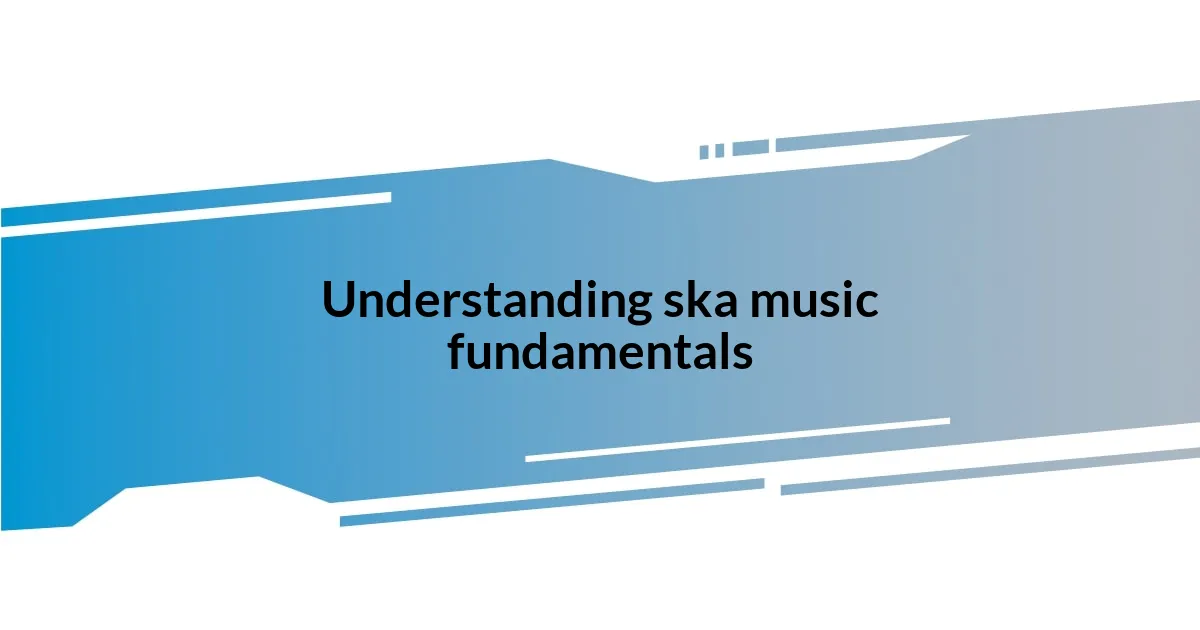
Understanding ska music fundamentals
At its core, ska music is a lively blend of jazz, rhythm and blues, and Caribbean mento, characterized by its upbeat tempo and distinctive offbeat guitar or piano chords. I remember the first time I heard that infectious rhythm—it felt like a shot of pure joy, propelling me to dance even when I didn’t know the steps. Don’t you find it amazing how a particular sound can evoke such energy and spontaneity?
The ska sound is often layered with brass instruments, creating a rich, vibrant texture that is impossible to ignore. I recall attending a local ska concert, surrounded by the brass section blaring triumphantly, feeling as if the musicians were speaking directly to my heart. How often do you get that exhilarating rush from music—when it feels like you’re not just hearing it, but living it?
Understanding the fundamental structure of ska is crucial; it typically includes a walking bass line that drives the groove while maintaining a strong backbeat. This mix sets the stage for both movement and connection among listeners. Think about the last time a song made you tap your foot or even break into a full-blown dance—wasn’t it that irresistible combination of rhythm and melody that pulled you in?
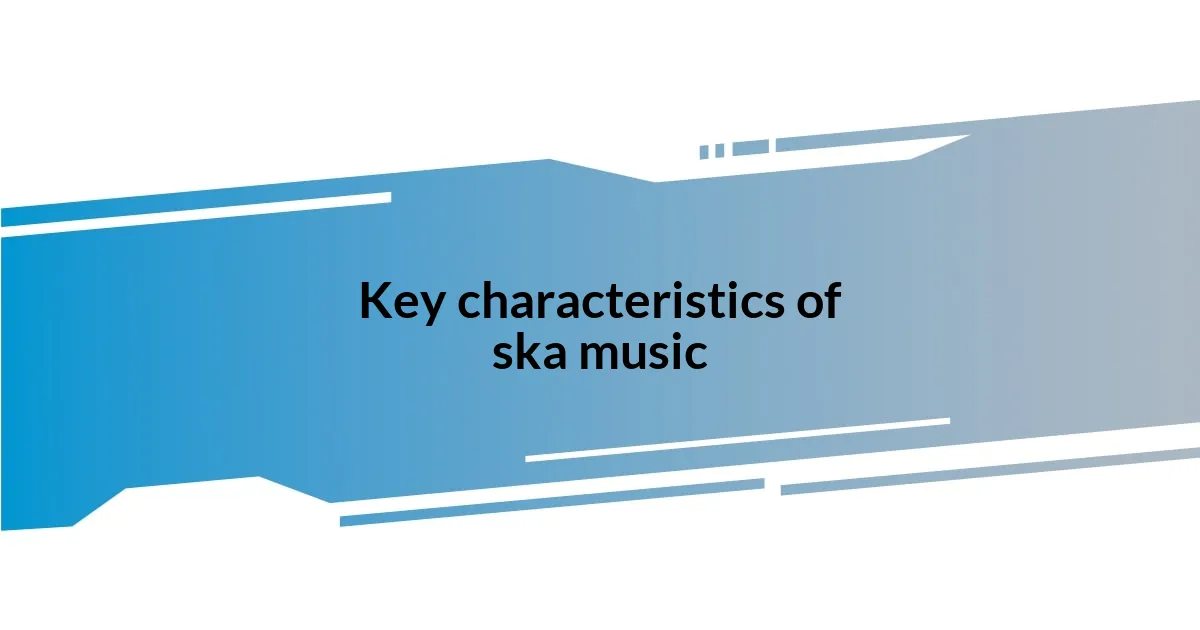
Key characteristics of ska music
The distinguishing feature of ska music lies in its signature offbeat rhythm, often described as the “one drop” beat. When I first started playing ska in a band, adjusting to this rhythm was both a challenge and a thrill; it’s captivating how it invites everyone to join in the groove. Have you ever noticed how that syncopated feel can instantly lighten the atmosphere at a gathering?
Brass instruments like trumpets and saxophones are not just an addition in ska; they are central to its identity, creating bold melodies that uplift the spirit. I can still recall my excitement the first time I soloed on my trumpet during a ska jam; the way my notes soared above the others reminded me of how powerful music can be in raising collective energy. Isn’t it incredible how the brass can transform a simple beat into something that resonates with deep joy?
Lastly, ska’s lyrical themes often blend social commentary with lightheartedness, creating a unique juxtaposition. I once wrote a song that tackled serious issues but delivered it with a smile; watching the audience dance while contemplating the lyrics was a surreal experience. Have you ever felt that delicate balance where serious meets fun, and it makes the message hit even harder?
| Characteristics | Description |
|---|---|
| Offbeat Rhythm | Signature “one drop” beat that invites participation and movement. |
| Brass Section | Central to ska’s identity, delivering bold melodies that uplift the spirit. |
| Lyrical Themes | A blend of social commentary and lightheartedness, creating a unique juxtaposition. |
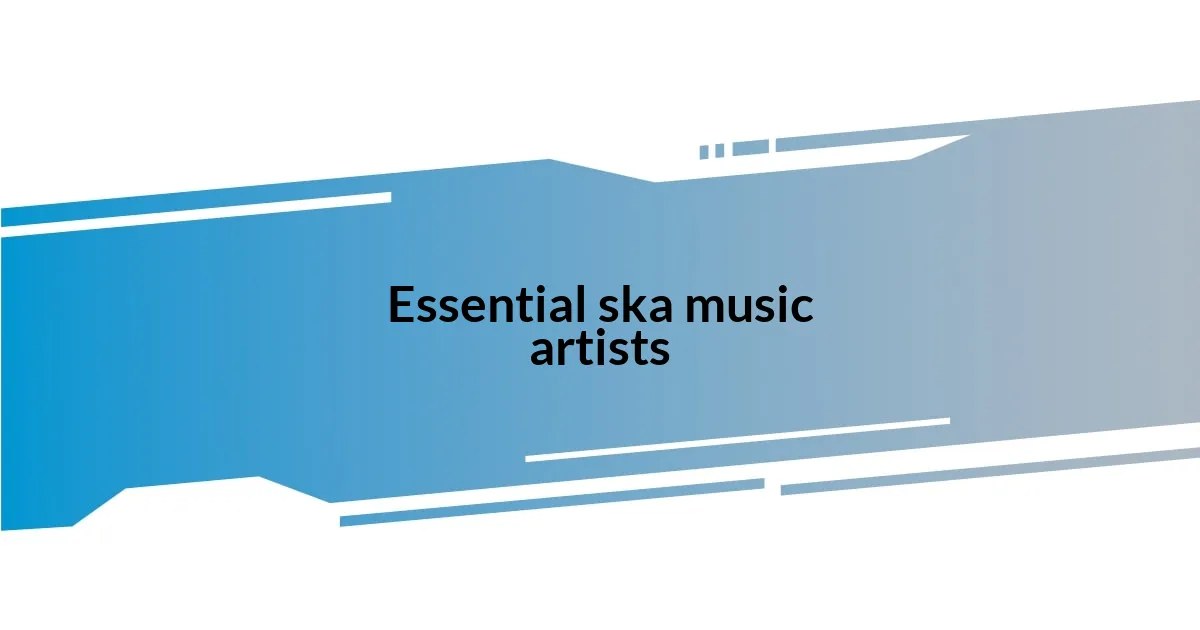
Essential ska music artists
When diving into the world of ska, certain artists emerge as instrumental in shaping its sound and culture. Listening to The Specials for the first time gave me a taste of how poignant social messages can blend with infectious melodies. Their song “Ghost Town” encapsulated a feeling of dislocation that resonated deeply with me, while the vibrant horns ignited a desire to move. Similarly, Madness has a special place in my heart; their upbeat tracks like “Our House” manage to weave nostalgia with cheer, making me reminisce about carefree days spent dancing with friends.
Here are some essential ska artists that have made significant contributions to the genre:
- The Specials: Pioneers of the Two-Tone ska movement, known for their powerful social commentary.
- Madness: Infused a pop sensibility into ska, creating catchy, memorable tunes.
- Toots and the Maytals: Reggae and ska legends, famous for their vibrant energy and classic hits.
- Desmond Dekker: One of the first Jamaican artists to gain international success, noteworthy for his impactful songs.
- The Selecter: A crucial part of the Two-Tone scene, with unique vocal harmonies and a distinctive sound.
Each of these artists captures different facets of ska, and listening to their music often feels like revisiting the vibrant cultural tapestry that is ska history. I’ll never forget dancing to Toots and the Maytals at a summer festival—their infectious energy sparked a wave of joy that had everyone bouncing along. Their rhythms make it easy to forget the mundane and simply embrace the moment.
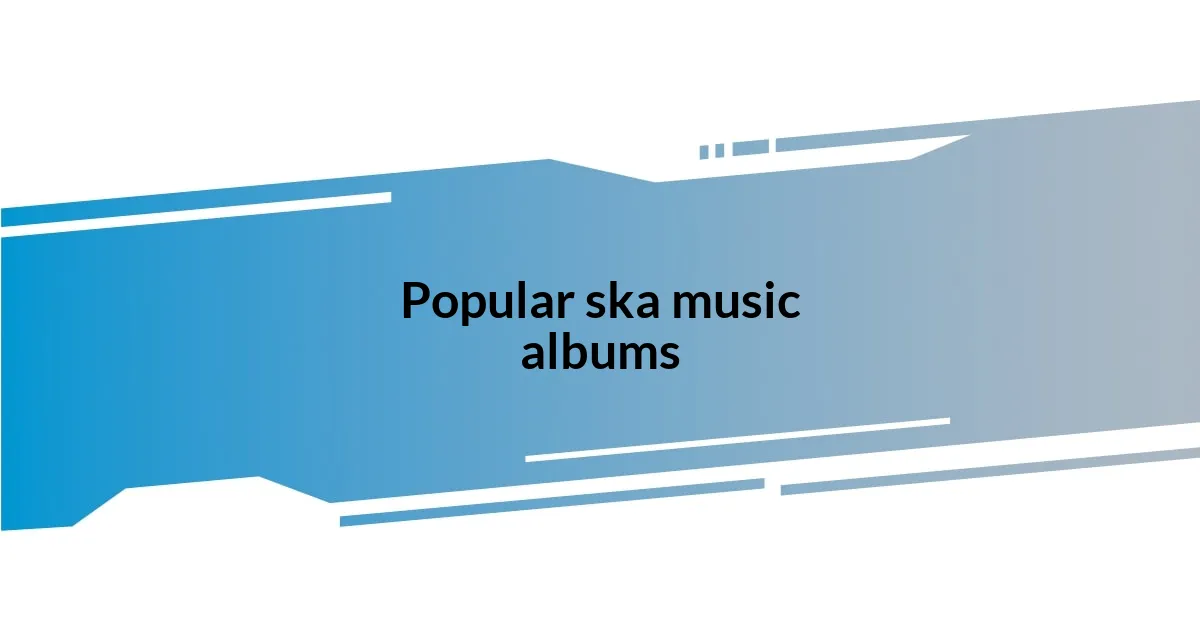
Popular ska music albums
One of my all-time favorite ska albums is “Ghost Town” by The Specials. When I first spun it at a party, I could feel the room shift; the haunting melody mixed with social commentary sparked conversations that lingered long after the last note faded. Isn’t it fascinating how music can bring such depth to a gathering, turning a simple playlist into a shared experience filled with emotion?
Then there’s Madness’s *”One Step Beyond”*, a classic that never fails to lift my spirits. Listening to “One Step Beyond” always reminds me of those nights with friends, dancing like nobody was watching. I still remember the joy of belting out the lyrics together, the room alive with energy. How can a record from decades ago still feel so fresh and fun?
Lastly, I can’t overlook *”Monkey Man”* by Toots and the Maytals. This album is pure adrenaline; I remember playing it during a road trip with friends, and it turned our drive into an unforgettable adventure. The way the horns cut through the rhythm makes every melody feel like it has its own heartbeat. Have you ever experienced music that literally makes you feel alive? I know I have, and it’s moments like these that make ska albums truly timeless.
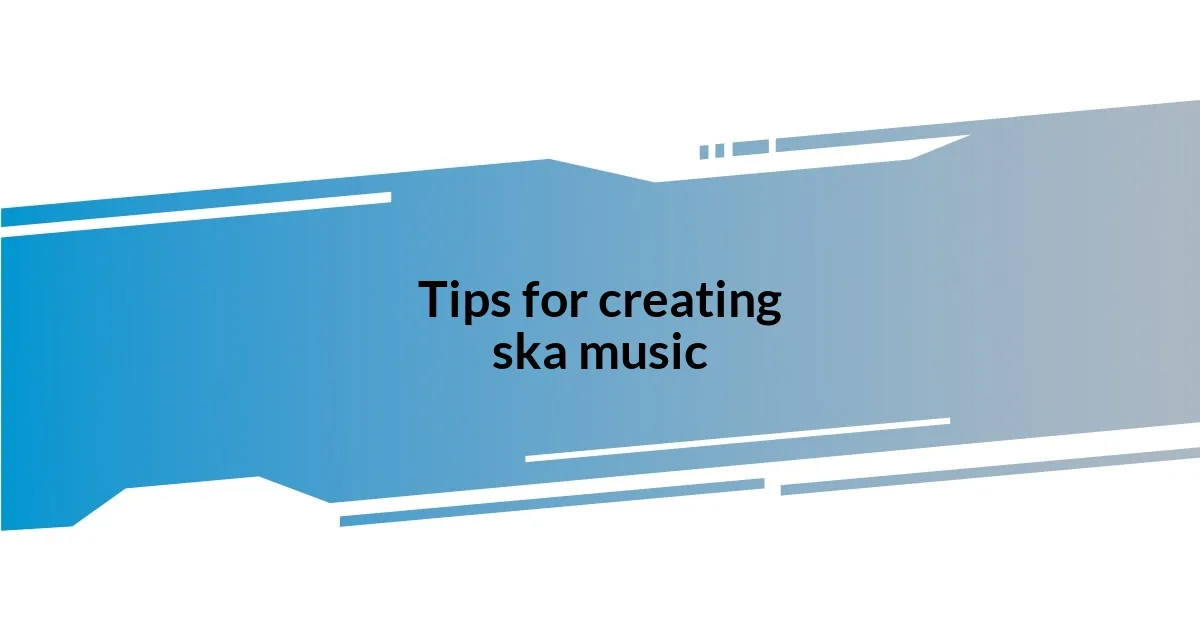
Tips for creating ska music
Creating ska music can be an exhilarating experience, and I’ve found that starting with a solid rhythm is key. Think about the signature upbeat tempo that makes you want to dance. When I first dove into writing my own ska tunes, I realized that the interplay between drums and bass lays down a groove that captures everyone’s attention. Have you ever felt the pulse of a great beat just grab you and pull you in? It’s that energy that sets the stage for everything else.
Incorporating brass instruments can elevate your sound tremendously. I still remember the first time I added a trumpet line to one of my tracks; the vibrant bursts of sound transformed the whole composition. The energy from those brass riffs can turn a good song into a party anthem. Isn’t it incredible how a well-placed horn section can make the hair on your arms stand up?
Lastly, don’t shy away from writing lyrics that resonate with your personal experiences. One of my favorite songs I penned was inspired by a chaotic summer job—my frustrations and joys turned into a catchy chorus that everyone could relate to. I’ve learned that authenticity shines through in music, making it engaging for listeners. So, what stories are waiting to be told in your own ska creations? Let those experiences shape your songs and create connections with others.
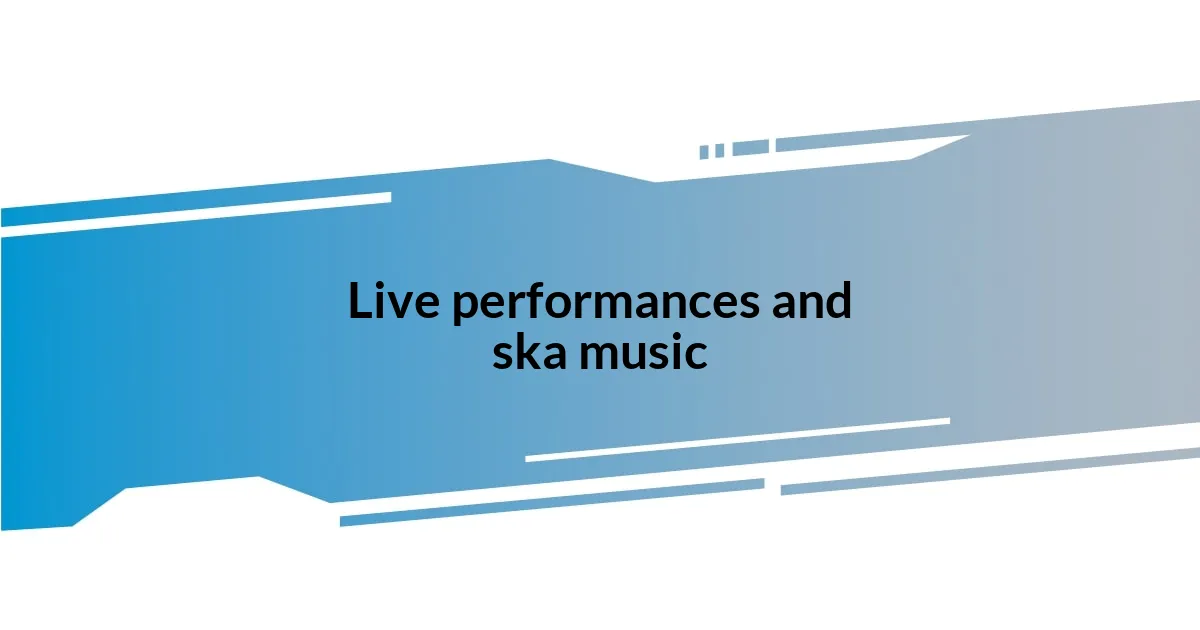
Live performances and ska music
Live ska performances are something else entirely. I recall attending a local gig where the energy was palpable. As soon as the band hit the first chord, the crowd erupted into a collective dance, and I felt the infectious spirit of ska unfurl in every corner of the venue. Isn’t it amazing how music can transform even the dullest space into a vibrant party?
There’s a distinct magic in witnessing musicians share their passion live. One time, I found myself at a festival where a ska band performed under a starlit sky. The brass section complemented the rhythmic strumming of the guitar, creating a sonic experience that felt unique to that moment. I still remember locking eyes with strangers, all of us smiling and dancing together as if we were old friends. How often do we get to connect with people in such an immediate and joyful way?
Moreover, the interaction between the band and the audience during live ska shows adds a layer of excitement that recordings simply can’t capture. I think about those moments when the lead singer invited us to sing along; it felt like we were all part of something bigger. It’s a shared enthusiasm that you can’t help but feel in your bones. Those experiences remind me why I love ska music so much—not just for the sound, but for the vibrant community it fosters. Have you ever felt that sense of togetherness at a live show? It’s an irreplaceable vibe that keeps me coming back for more.
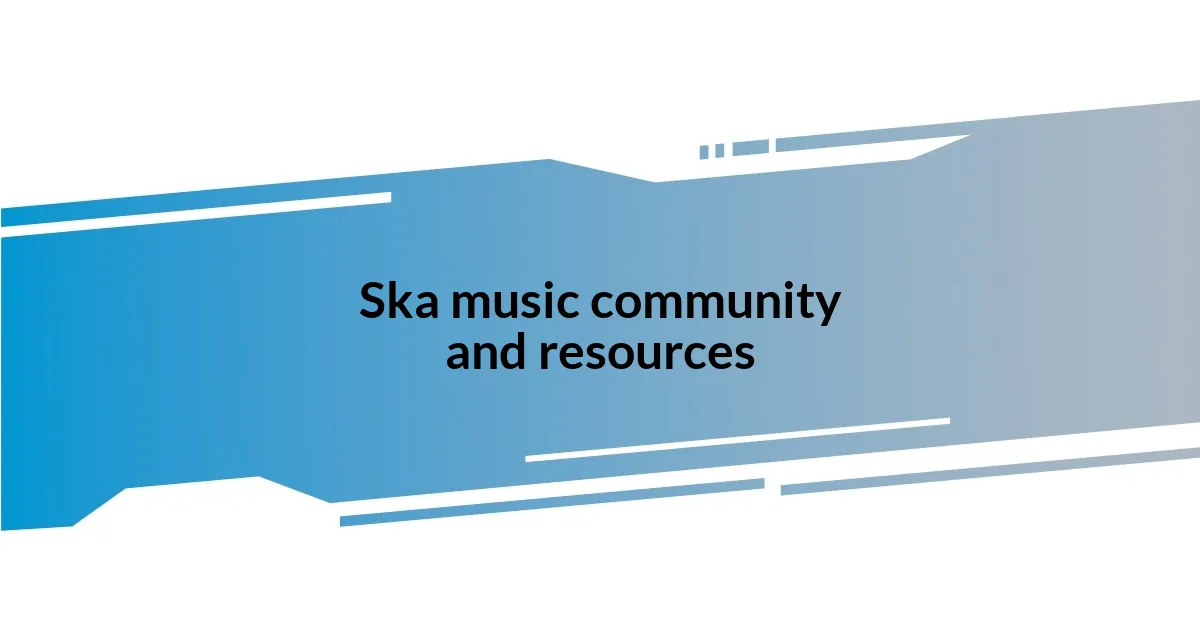
Ska music community and resources
There’s something truly special about the ska music community that brings people together. I remember the first time I found an online forum dedicated to ska enthusiasts. The lively discussions about favorite bands and upcoming shows instantly made me feel part of a larger family, even if we were spread across different countries. Have you ever stumbled upon a group where everyone seems to share your passion? It’s a warm feeling, knowing there are others who resonate with your love for the genre.
Local ska scenes are often buzzing with activity, and diving into them can be a rewarding experience. I once volunteered at a ska festival in my hometown, and I was blown away by the camaraderie among fans and musicians alike. Everyone pitched in to keep the energy alive, whether it was setting up stages or sharing food and stories between acts. Isn’t it fascinating how music can cultivate such a rich network of friendships? It’s moments like these that remind me how vibrant and inclusive the ska community is.
For those looking to dive deeper, there are countless resources available to connect with ska lovers. From social media groups to dedicated websites, the information is just a few clicks away. I personally love exploring playlists curated by fellow fans on streaming platforms; they often introduce me to hidden gems that spark my creativity. Have you ever discovered an artist through a recommendation? Those serendipitous moments can lead to incredible musical journeys that deepen your appreciation for ska music.